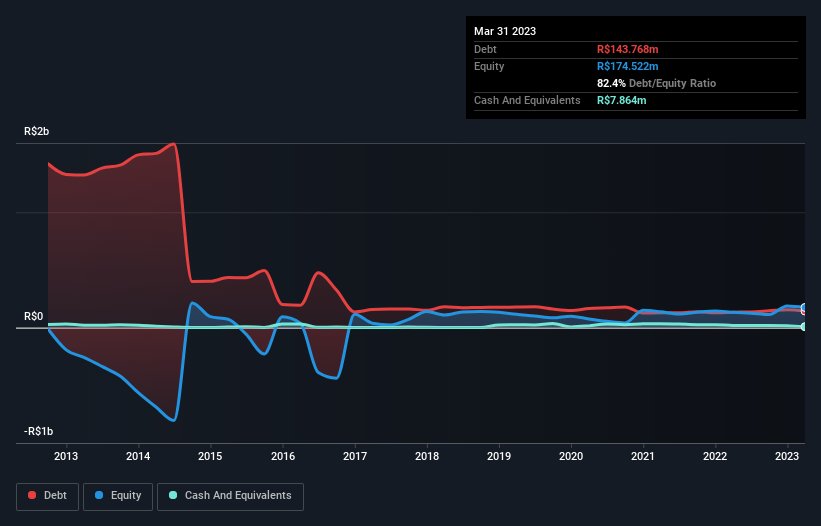Legendary fund manager Li Lu (who Charlie Munger backed) once said, 'The biggest investment risk is not the volatility of prices, but whether you will suffer a permanent loss of capital.' It's only natural to consider a company's balance sheet when you examine how risky it is, since debt is often involved when a business collapses. Importantly, Lupatech S.A. (BVMF:LUPA3) does carry debt. But the real question is whether this debt is making the company risky.
When Is Debt A Problem?
Debt assists a business until the business has trouble paying it off, either with new capital or with free cash flow. If things get really bad, the lenders can take control of the business. However, a more common (but still painful) scenario is that it has to raise new equity capital at a low price, thus permanently diluting shareholders. Having said that, the most common situation is where a company manages its debt reasonably well - and to its own advantage. When we think about a company's use of debt, we first look at cash and debt together.
Check out our latest analysis for Lupatech
What Is Lupatech's Debt?
The image below, which you can click on for greater detail, shows that at March 2023 Lupatech had debt of R$143.8m, up from R$133.4m in one year. However, it also had R$7.86m in cash, and so its net debt is R$135.9m.

A Look At Lupatech's Liabilities
The latest balance sheet data shows that Lupatech had liabilities of R$103.7m due within a year, and liabilities of R$268.2m falling due after that. Offsetting these obligations, it had cash of R$7.86m as well as receivables valued at R$64.4m due within 12 months. So it has liabilities totalling R$299.6m more than its cash and near-term receivables, combined.
This deficit casts a shadow over the R$82.6m company, like a colossus towering over mere mortals. So we'd watch its balance sheet closely, without a doubt. After all, Lupatech would likely require a major re-capitalisation if it had to pay its creditors today. There's no doubt that we learn most about debt from the balance sheet. But you can't view debt in total isolation; since Lupatech will need earnings to service that debt. So if you're keen to discover more about its earnings, it might be worth checking out this graph of its long term earnings trend.
Over 12 months, Lupatech made a loss at the EBIT level, and saw its revenue drop to R$102m, which is a fall of 2.8%. We would much prefer see growth.
Caveat Emptor
Importantly, Lupatech had an earnings before interest and tax (EBIT) loss over the last year. Its EBIT loss was a whopping R$50m. If you consider the significant liabilities mentioned above, we are extremely wary of this investment. Of course, it may be able to improve its situation with a bit of luck and good execution. But we think that is unlikely, given it is low on liquid assets, and burned through R$11m in the last year. So we think this stock is risky, like walking through a dirty dog park with a mask on. The balance sheet is clearly the area to focus on when you are analysing debt. However, not all investment risk resides within the balance sheet - far from it. Case in point: We've spotted 3 warning signs for Lupatech you should be aware of, and 1 of them is potentially serious.
If, after all that, you're more interested in a fast growing company with a rock-solid balance sheet, then check out our list of net cash growth stocks without delay.
New: AI Stock Screener & Alerts
Our new AI Stock Screener scans the market every day to uncover opportunities.
• Dividend Powerhouses (3%+ Yield)
• Undervalued Small Caps with Insider Buying
• High growth Tech and AI Companies
Or build your own from over 50 metrics.
Have feedback on this article? Concerned about the content? Get in touch with us directly. Alternatively, email editorial-team (at) simplywallst.com.
This article by Simply Wall St is general in nature. We provide commentary based on historical data and analyst forecasts only using an unbiased methodology and our articles are not intended to be financial advice. It does not constitute a recommendation to buy or sell any stock, and does not take account of your objectives, or your financial situation. We aim to bring you long-term focused analysis driven by fundamental data. Note that our analysis may not factor in the latest price-sensitive company announcements or qualitative material. Simply Wall St has no position in any stocks mentioned.
About BOVESPA:LUPA3
Overvalued with worrying balance sheet.
Similar Companies
Market Insights
Weekly Picks

THE KINGDOM OF BROWN GOODS: WHY MGPI IS BEING CRUSHED BY INVENTORY & PRIMED FOR RESURRECTION


Why Vertical Aerospace (NYSE: EVTL) is Worth Possibly Over 13x its Current Price


The Quiet Giant That Became AI’s Power Grid
Recently Updated Narratives

Growing between 25-50% for the next 3-5 years

SLI is share to watch next 5 years


The "Molecular Pencil": Why Beam's Technology is Built to Win
Popular Narratives


MicroVision will explode future revenue by 380.37% with a vision towards success


NVDA: Expanding AI Demand Will Drive Major Data Center Investments Through 2026




